名词性从句
什么叫名词性从句
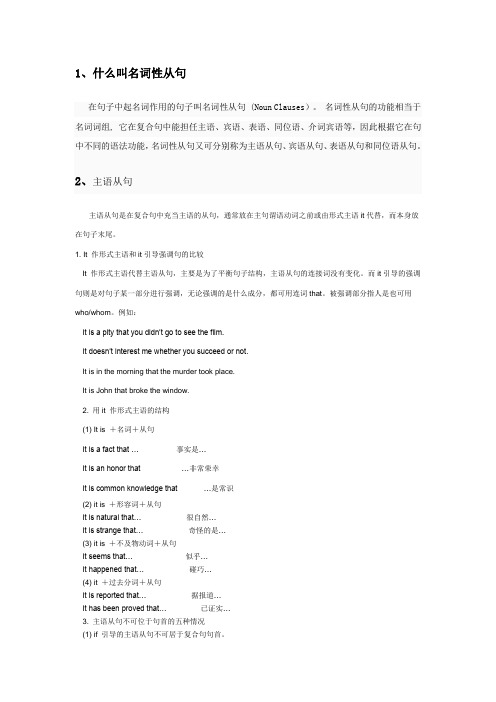
1、什么叫名词性从句在句子中起名词作用的句子叫名词性从句 (Noun Clauses)。
名词性从句的功能相当于名词词组, 它在复合句中能担任主语、宾语、表语、同位语、介词宾语等,因此根据它在句中不同的语法功能,名词性从句又可分别称为主语从句、宾语从句、表语从句和同位语从句。
2、主语从句主语从句是在复合句中充当主语的从句,通常放在主句谓语动词之前或由形式主语it代替,而本身放在句子末尾。
1. It 作形式主语和it引导强调句的比较It 作形式主语代替主语从句,主要是为了平衡句子结构,主语从句的连接词没有变化。
而it引导的强调句则是对句子某一部分进行强调,无论强调的是什么成分,都可用连词that。
被强调部分指人是也可用who/whom。
例如:It is a pity that you didn’t go to see the film.It doesn’t interest me whether you succeed or not.It is in the morning that the murder took place.It is John that broke the window.2. 用it 作形式主语的结构(1) It is +名词+从句It is a fact that … 事实是…It is an honor that …非常荣幸It is common knowledge that …是常识(2) it is +形容词+从句It is natural that… 很自然…It is strange that… 奇怪的是…(3) it is +不及物动词+从句It seems that… 似乎…It happened that… 碰巧…(4) it +过去分词+从句It is reported that… 据报道…It has been proved that… 已证实…3. 主语从句不可位于句首的五种情况(1) if 引导的主语从句不可居于复合句句首。
名词性从句讲解(最全版)
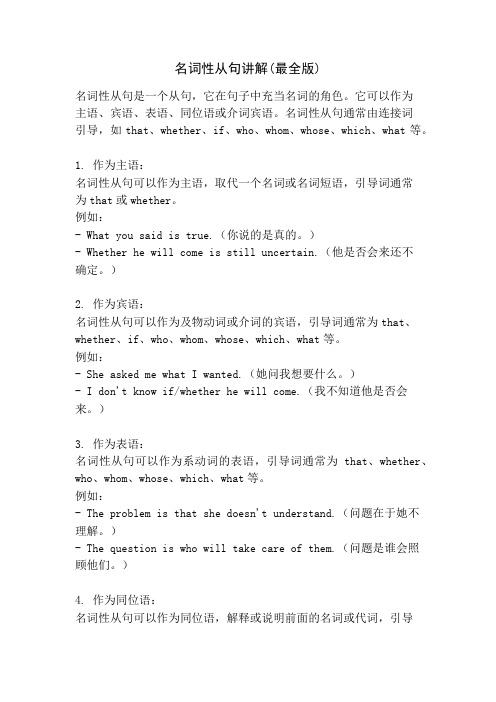
名词性从句讲解(最全版)名词性从句是一个从句,它在句子中充当名词的角色。
它可以作为主语、宾语、表语、同位语或介词宾语。
名词性从句通常由连接词引导,如that、whether、if、who、whom、whose、which、what等。
1. 作为主语:名词性从句可以作为主语,取代一个名词或名词短语,引导词通常为that或whether。
例如:- What you said is true.(你说的是真的。
)- Whether he will come is still uncertain.(他是否会来还不确定。
)2. 作为宾语:名词性从句可以作为及物动词或介词的宾语,引导词通常为that、whether、if、who、whom、whose、which、what等。
例如:- She asked me what I wanted.(她问我想要什么。
)- I don't know if/whether he will come.(我不知道他是否会来。
)3. 作为表语:名词性从句可以作为系动词的表语,引导词通常为that、whether、who、whom、whose、which、what等。
例如:- The problem is that she doesn't understand.(问题在于她不理解。
)- The question is who will take care of them.(问题是谁会照顾他们。
)4. 作为同位语:名词性从句可以作为同位语,解释或说明前面的名词或代词,引导词通常为that、whether、who、whom、whose、which、what等。
例如:- The fact that he lied surprised me.(他撒谎的事实让我感到惊讶。
)- His belief that she will succeed is unwavering.(他坚信她会成功。
名词性从句
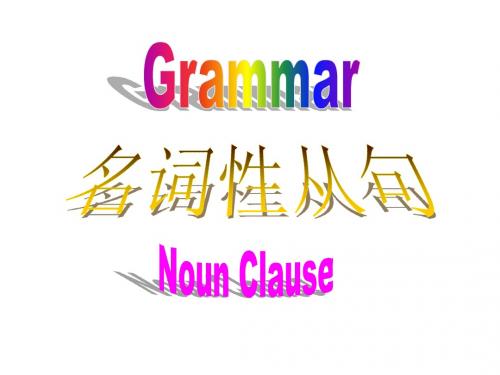
出品
三、宾语从句
在句中充当及物动词或介词宾语的句子叫做 宾语从句。 我不知道你会来这里。 I don’t know (that) you will come here.
三、宾语从句
1、用作及物动词的宾语 (1) They pretended that they were reading in the room. (2) I didn’t know what they were talking about.
以it作形式主语,把主语从句后置的常 用句型有:
1. It+be+形容词+that从句
It is/was certain that – clause
clear
important necessary probable possible
出品
(1)It is certain that she will do
出品
一、主语从句
在句中充当主语的从句叫做主语从句。 他星期三来这里是肯定的。
That he will come here on Wednesday is certain.
注意:从句作主语时,就算是句子意思完整,都 要加上从属连词that, 而且that不能省略,不充当 成分仅起连接作用。 他星期三是否来这里还不肯定。 Whether he will come here on Wednesday is not certain. 注意:主语从句表示“是否” 只用 “whether” 而不用“if”
well in her exam.
(2) It is probable that he told her everything.
www.010englBiblioteka 出品
名词性从句

语序:陈述语序
在句中充当主语的从句称为主语 从句。英语中主语从句的句型可分 为两大类: 直接将主语从句放在主语位置上; 用it作形式主语,将真正的主语从 句后移,放在其他成分后。
让我们先说说第一类吧!
一、连接词(只起连接作用,在从句中不充当句子成分)
that:无词义。 e.g.: 他赢得比赛一事在我国引起巨大轰动。 That he won the game made a tremendous stir in our country. whether:“是否”。可单独使用,也可与or或or not连用。 e.g.: 我们明天是否能去春游取决于天气。 Whether we can go for a spring outing depends on the weather. 他们是否会来还未告诉我们。 Whether they will come has not been told to us.
四、主语从句与主谓一致
一个从句作主语时,谓语动词通常用单数形式, 特别是用it作形式主语的句型。 e.g.: Whether this kind of chemicals is better has not been tried.
当what引导主从,应遵循意义一致原则,谓语动 词选用相应形式。表语是复数时,谓语动词用复数 形式。 e.g.: What we do willingly is easy. What they were searching for were the missing gems.
Introduction
名词性从句:包括四种:主语从句、表语从句、宾语从
句、同位语从句。
连词:引导名词性从句的连词有以下三类
连接词:只起连接作用,在从句中不充当句子成分; 连接代词:连接主从句,并在从句中作主语/宾语/表 语/定语; 连接副词:连接主从句,并在从句中作时状/地状/原 因状/方式状。
名词性从句
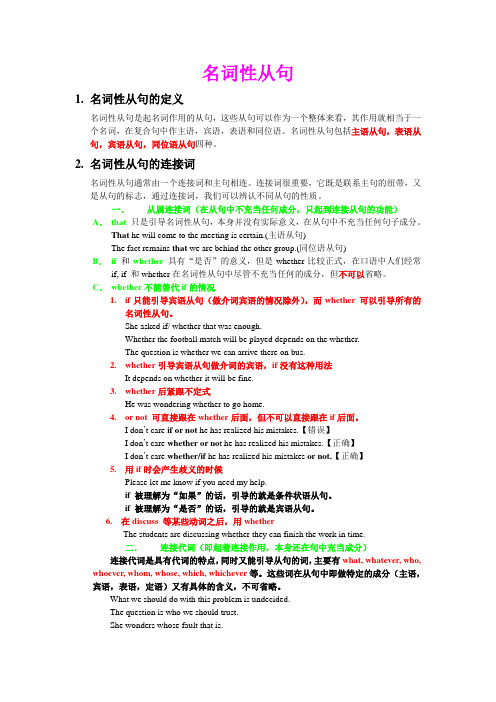
名词性从句1.名词性从句的定义名词性从句是起名词作用的从句,这些从句可以作为一个整体来看,其作用就相当于一个名词,在复合句中作主语,宾语,表语和同位语。
名词性从句包括主语从句,表语从句,宾语从句,同位语从句四种。
2.名词性从句的连接词名词性从句通常由一个连接词和主句相连。
连接词很重要,它既是联系主句的纽带,又是从句的标志,通过连接词,我们可以辨认不同从句的性质。
一.从属连接词(在从句中不充当任何成分,只起到连接从句的功能)A.that 只是引导名词性从句,本身并没有实际意义,在从句中不充当任何句子成分。
That he will come to the meeting is certain.(主语从句)The fact remains that we are behind the other group.(同位语从句)B.if和whether具有“是否”的意义,但是whether比较正式,在口语中人们经常if, if 和whether在名词性从句中尽管不充当任何的成分,但不可以省略。
C.whether不能替代if的情况1.if只能引导宾语从句(做介词宾语的情况除外),而whether 可以引导所有的名词性从句。
She asked if/ whether that was enough.Whether the football match will be played depends on the whether.The question is whether we can arrive there on bus.2.whether引导宾语从句做介词的宾语,if没有这种用法It depends on whether it will be fine.3.whether后紧跟不定式He was wondering whether to go home.4.or not 可直接跟在whether后面,但不可以直接跟在if后面。
名词性从句(整理完整版)
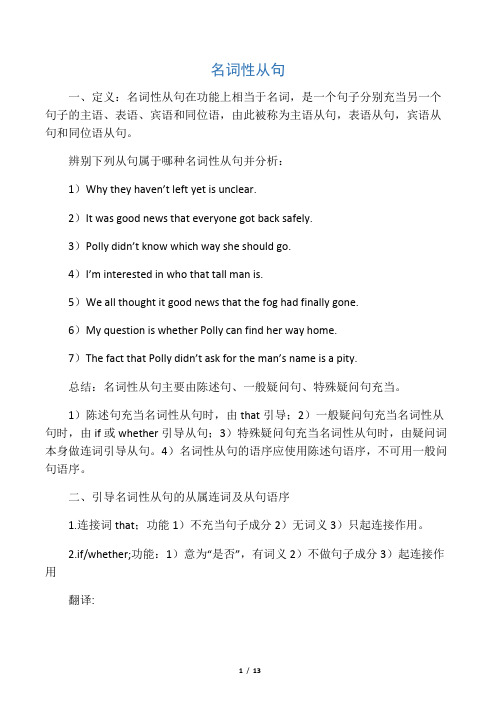
名词性从句一、定义:名词性从句在功能上相当于名词,是一个句子分别充当另一个句子的主语、表语、宾语和同位语,由此被称为主语从句,表语从句,宾语从句和同位语从句。
辨别下列从句属于哪种名词性从句并分析:1)Why they haven’t left yet is unclear.2)It was good news that everyone got back safely.3)Polly didn’t know which way she should go.4)I’m interested in who that tall man is.5)We all thought it good news that the fog had finally gone.6)My question is whether Polly can find her way home.7)The fact that Polly didn’t ask for the man’s name is a pity.总结:名词性从句主要由陈述句、一般疑问句、特殊疑问句充当。
1)陈述句充当名词性从句时,由that引导;2)一般疑问句充当名词性从句时,由if或whether引导从句;3)特殊疑问句充当名词性从句时,由疑问词本身做连词引导从句。
4)名词性从句的语序应使用陈述句语序,不可用一般问句语序。
二、引导名词性从句的从属连词及从句语序1.连接词that;功能1)不充当句子成分2)无词义3)只起连接作用。
2.if/whether;功能:1)意为“是否”,有词义2)不做句子成分3)起连接作用翻译:1)I know that he will come thisevening.___________________________________________2) Whether we will go there or not hasn’t been decided yet.______________________________3.连接代词:what(ever), which(ever), who(ever), whom(ever), whose(ver)功能:1)有词义2)引起从句3)且在从句中充当一定的句子成分,常做从句中的主语、宾语、表语和定语。
名词性从句
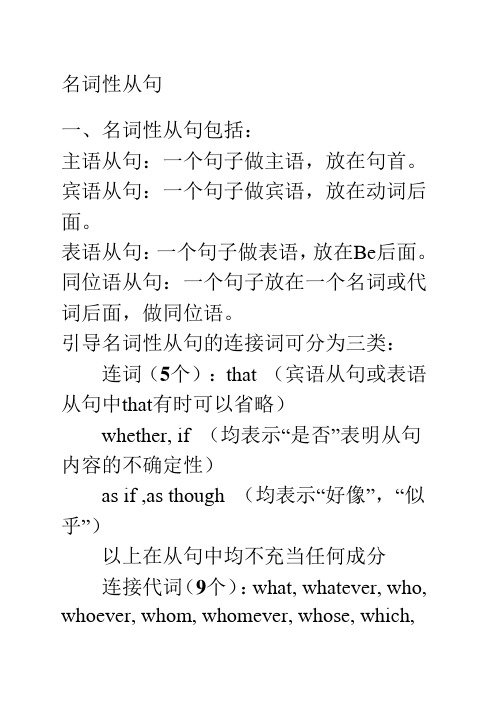
名词性从句一、名词性从句包括:主语从句:一个句子做主语,放在句首。
宾语从句:一个句子做宾语,放在动词后面。
表语从句:一个句子做表语,放在Be后面。
同位语从句:一个句子放在一个名词或代词后面,做同位语。
引导名词性从句的连接词可分为三类:连词(5个):that (宾语从句或表语从句中that有时可以省略)whether, if (均表示“是否”表明从句内容的不确定性)as if ,as though (均表示“好像”,“似乎”)以上在从句中均不充当任何成分连接代词(9个):what, whatever, who, whoever, whom, whomever, whose, which,whichever连接副词(7个):when, where, how, why, whenever, wherever, however二、连词that需要注意的用法:1、(难点)不及物动词加介词再加宾语的用法,在宾语从句中要省略介词。
比如:He boasted of his success. (boast of + 宾语)He boasted that he was a success. (boast of+宾语从句,省略介词of)但是,有些固定结构中能用介词+that的用法;包括besides/beyond that(这两个都表示除---外), but that(要不是;若非), except that(除去), in that(因为), save that(除---外)的用法:①、She knew nothing besides/beyond that he was there.②、He didn’t really know what he was going to say beyond that the situation demanded something romatic.③、Noting would please him but that we goalong.④、I know nothing except that he left home early that morning.⑤、I prefer his plan to yours in that I think it’s more practical.⑥、I am well save that I have a cold.2、宾语从句中that有时省;有时不能省略:①、当that和主句谓语之间或者从句之间有插入语时,that不能省略:He judged that, because he was a child, he didn’t know wine.②、当that从句和另一名词性从句并列做宾语时,that不能省略:Everyone knows what happened and that he was worried.③、当that从句是双宾语中的直接宾语时,that一般不省略。
名词性从句
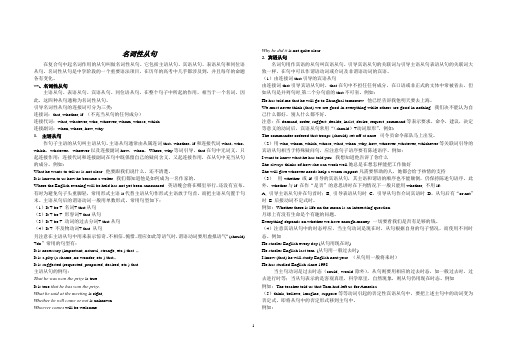
名词性从句在复合句中起名词作用的从句叫做名词性从句。
它包括主语从句、宾语从句、表语从句和同位语从句。
名词性从句是中学阶段的一个重要语法项目,在历年的高考中几乎都涉及到,并且每年的命题各有变化。
一、名词性从句主语从句、表语从句、宾语从句、同位语从句,在整个句子中所起的作用,相当于一个名词。
因此,这四种从句通称为名词性从句。
引导名词性从句的连接词可分为三类:连接词:that, whether, if (不充当从句的任何成分)连接代词:what, whatever, who, whoever, whom, whose, which.连接副词:when, where, how, why1.主语从句作句子主语的从句叫主语从句。
主语从句通常由从属连词that,whether,if和连接代词what,who,which,whatever,whoever以及连接副词how,when,Where, why等词引导。
that在句中无词义,只起连接作用;连接代词和连接副词在句中既保留自己的疑问含义、又起连接作用,在从句中充当从句的成分。
例如:What he wants to tell us is not clear. 他要跟我们说什么,还不清楚。
It is known to us how he became a writer. 我们都知道他是如何成为一名作家的。
Where the English evening will be held has not yet been announced. 英语晚会将在哪里举行,还没有宣布。
有时为避免句子头重脚轻,常用形式主语it代替主语从句作形式主语放于句首,而把主语从句置于句末。
主语从句后的谓语动词一般用单数形式。
常用句型如下:(1)It + be + 名词+ that从句(2)It + be + 形容词+ that从句(3)It + be + 动词的过去分词+ that从句(4)It + 不及物动词+ that 从句另注意在主语从句中用来表示惊奇、不相信、惋惜、理应如此等语气时,谓语动词要用虚拟语气“(should) +do”常用的句型有:It is necessary (important, natural, strange, etc.) that …It is a pity (a shame, no wonder, etc.) that…It is suggested (requested, proposed, desired, etc.) that主语从句的例句:That he was won the prize is true.It is true that he has won the prize.What he said at the meeting is right,Whether he will come or not is unknown.Whoever comes will be welcome. Why he did it is not quite clear.2. 宾语从句名词句用作宾语的从句叫宾语从句。
- 1、下载文档前请自行甄别文档内容的完整性,平台不提供额外的编辑、内容补充、找答案等附加服务。
- 2、"仅部分预览"的文档,不可在线预览部分如存在完整性等问题,可反馈申请退款(可完整预览的文档不适用该条件!)。
- 3、如文档侵犯您的权益,请联系客服反馈,我们会尽快为您处理(人工客服工作时间:9:00-18:30)。
名词性从句1名词性从句:在句子中起到一个名词的作用,并充当句子的主语、宾语、表语或同位语的从句。
分别称之为主语从句、表语从句、宾语从句和同位语从句。
了解并正确使用关联词是写好名词性从句的关键。
判断依据:1.看在从句中有无具体意义;2.看在从句中有无充当成分。
如有,是充当什么成分常见的关联词:which, how, why, whenever, what, whether who, when, whom, whose, that,whatever, whoever, where, whomever, wherever,whichever,if,however一、名词性从句的关联词的分类、词义和用法见下表:二、从句中that和what的区别连词that只起连接作用,在从句中不作成分,不含有疑问意义,而what在从句中作成分,常含有疑问意义。
表“…的东西/事情/样子/的话/的地方”,在从句中充当主语、宾语、表语。
主语从句、表语从句、同位语从句中用that但不能省略。
1. I wonder if this is ______you are looking for.2. Our school is quite different from _______ it was before.3. Father made a promise ______ if I passed the examination he would buy me a computer.I can’t understand is why he has changed his mind.earth is round is known to us all.6. Is _____ he told us true7. I have no doubt _____ he will come.8. I have no idea _____ he did that afternoon.三、who 与 whoever ;what 与 whateverwhoever, whatever等引导的名词性从句不含有疑问意义,相当于名词后加一个定语从句,而who, what等引导的名词性从句都含有疑问意义。
was said here must be kept secret.2. _______we need is more time.made the long distance call to him is not important.breaks the law will be punished.四、that 引导同位语从句与that 引导定语从句的区别引导同位语从句的that 无实际意义, 不作从句的任何成分, 而引导定语从句的that 从句的某个成分。
He told me the news that our team won the match. (同位语从句)He told me the news that was very exciting. (定语从句)五、if 与whether1. 主语从句:whether引导主语从句位于句首,if引导主语从句不能位于句首Whether we will succeed is still a question.It is not known if he will come.2. 表语从句:只能用whether ,if不能引导表语从句The problem is whether the film is worth seeing.3. 宾语从句:whether 与if 有时可以换用,但下列情况只能用whether①介词后的宾语从句Everything depends on whether it is fine tomorrow.②whether…or not的宾语从句I don’t know whether or not she’ll like it.③复合不定式只能用whetherTell us whether to go or stay here.六、在have no idea 之后常用wh-引导同位语从句I have no idea where he has gone.I have no idea when he did it.I have no idea what he did.七、it作形式主语或形式宾语的高级句型1.it作形式主语的常用句型(1)It+系动词+形容词 (necessary/right/likely/unlikely/ wrong/ important/ certain等)+that 从句(2)It+be+名词(短语)(a pity/a shame/no wonder等)+that从句(3)It+be+过去分词(said/told/reported/decided等)+that从句(4)It+特殊动词(seems, appears, happens, matters)+that从句(5)It doesn't matter who/whether/if等从句2.it作形式宾语的常用句型动词find, feel, think, consider, make, believe, guess, suppose, assume等后有宾语补足语时,则需要用it作形式宾语,而将宾语从句后置。
八、有用的句型1.… 的原因是…1)The reason for + 名词+ is that…2)The reason why + 句子+ is that…他缺席的原因是他……。
1)The reason for his absence is that…2)The reason why he was absent is that…2. This / That / It is + where / why / how / because, 表示具体的地点、原因、方式1)这就是我们为什么应该保持健康的原因。
This is why we should keep healthy.2) 这就是我停车的地方。
This is where I parked my car.过关强练:Ⅰ.用正确的关联词填空1. 我的问题是我没有时间和他交流。
My problem is______ I have no time to communicate with him.2. 问题是这本书是否值得一读。
The problem is_______ this book is worth reading.3. 她没有去上学的原因是她生病了。
The reason_____ she didn’t go to school was______ she was ill.4. 我的意见是你不该一个人去。
My opinion is______ you shouldn’t go alone.5. 今天的中国已不是过去的样子了。
China today is no longer_____ she used to be.6. 那是因为这两兄弟想要打赌。
Th at’s_______ the two brothers wanted to make a bet.7. 我的建议是我们明天应该早点出发。
My suggestion is______ we (should) set off early tomorrow.Ⅱ.用宾语从句或表语从句完成下列句子1.a. Where is the post officeb. He doesn't know that.He doesn't know__________________________________.2.a. How should we do the workb. Did she say anything about itDid she say anything about ________________________3.a. Will that man turn up in timeb. It's a question.The question is________________________________4.a. Yesterday's game makes me feel excited.Yesterday's game is ________________________________.5.a. He told me something that I should read.He told me _______________________________________.Ⅲ.用主语从句改写下列句子1.a. Is he coming or not b. It is still uncertain.It is still uncertain _________________________________.2.a. Why did he do it b. It remains a mystery.________________________ remains a mystery3.a. Something controls the flow of carbon dioxide in and out the atmosphere today. is pretty well understood.It is pretty well understood_______________________4.a. Such a thing happened in your class. b. It was a pity._________________________________________________5. The thing that you need is more practice._________________________________________________Ⅳ.用同位语从句改写下列句子1.a. They are familiar with the opinion. b. All matter consists of atoms.They are familiar with the opinion__________________________________________________. 2.a. Where did you get the idea b. I could not come.Where did you get the idea _________________________________________________3.a. We haven't yet settled the question. b. Where are we going to spend our summer vacation We haven't yet settled the question _________________________________________________. 4.a. They didn't finish the work. b. They have to face the fact._________________________________________________5.a. I made a promise. b. I will write to you as soon as I get to Beijing._________________________________________________Ⅴ.将下列每组题中的两个简单句合并为一个含有名词性从句的复合句1.a. The manager said a lot at the meeting. b. His words were very attractive.________________________________________________2.a. When did you enter the roomb. The police wants to know it.________________________________________________3.a. This is my decision. b. All of us are to start at 6 o'clock tomorrow morning.________________________________________________4.a. Our women volleyball team had won the championship. b. The news encouraged us all greatly. _________________________________________________5.a. We should practise oral English for an hour every day. b. That was our rule.We made it a rule that ________________________________________________6.a. Many people in the area are short of money. b. This is a question._________________________________________________7.a. The manager said a lot at the meeting. b. His words were very attractive._________________________________________________8.a. He has succeeded in passing the examination. b. It is good news._________________________________________________9.a. We should not overuse our eyes and do more outdoor exercises. b. He suggested it. _________________________________________________10.a. Our women volleyball team had won the championship. b. The news was it.c. The news encouraged us all greatly._________________________________________________11.a. She lost her way and her home was nearby. b.The girl told it to us._________________________________________________Ⅵ. 单句翻译1.我坚信未来掌控在我们自己的手中。
